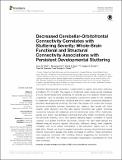Decreased Cerebellar-Orbitofrontal Connectivity Correlates with Stuttering Severity: Whole-Brain Functional and Structural Connectivity Associations with Persistent Developmental Stuttering
Author(s)
Sitek, Kevin R.; Cai, Shanqing; Beal, Deryk S.; Perkell, Joseph S.; Guenther, Frank H.; Ghosh, Satrajit S.; ... Show more Show less
DownloadDecreased Cerebellar-Orbitofrontal.pdf (3.621Mb)
PUBLISHER_CC
Publisher with Creative Commons License
Creative Commons Attribution
Terms of use
Metadata
Show full item recordAbstract
Persistent developmental stuttering is characterized by speech production disfluency and affects 1% of adults. The degree of impairment varies widely across individuals and the neural mechanisms underlying the disorder and this variability remain poorly understood. Here we elucidate compensatory mechanisms related to this variability in impairment using whole-brain functional and white matter connectivity analyses in persistent developmental stuttering. We found that people who stutter had stronger functional connectivity between cerebellum and thalamus than people with fluent speech, while stutterers with the least severe symptoms had greater functional connectivity between left cerebellum and left orbitofrontal cortex (OFC). Additionally, people who stutter had decreased functional and white matter connectivity among the perisylvian auditory, motor, and speech planning regions compared to typical speakers, but greater functional connectivity between the right basal ganglia and bilateral temporal auditory regions. Structurally, disfluency ratings were negatively correlated with white matter connections to left perisylvian regions and to the brain stem. Overall, we found increased connectivity among subcortical and reward network structures in people who stutter compared to controls. These connections were negatively correlated with stuttering severity, suggesting the involvement of cerebellum and OFC may underlie successful compensatory mechanisms by more fluent stutterers.
Date issued
2016-05Department
Institute for Medical Engineering and Science; Massachusetts Institute of Technology. Research Laboratory of Electronics; McGovern Institute for Brain Research at MITJournal
Frontiers in Human Neuroscience
Publisher
Frontiers Media S.A.
Citation
Sitek, Kevin R., Shanqing Cai, Deryk S. Beal, Joseph S. Perkell, Frank H. Guenther, and Satrajit S. Ghosh. “Decreased Cerebellar-Orbitofrontal Connectivity Correlates with Stuttering Severity: Whole-Brain Functional and Structural Connectivity Associations with Persistent Developmental Stuttering.” Front. Hum. Neurosci. 10 (May 3, 2016).
Version: Final published version
ISSN
1662-5161